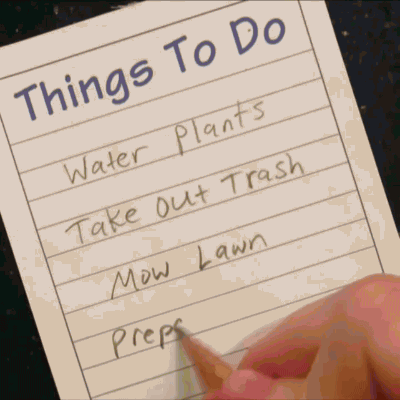Imagine a life with no early morning traffic. No packed lunches. No dress codes. No pants. Sound like a dream come true? If so, working at home might just be the peanut butter to your jelly. The ginger to your sushi. The Ben to your Jerry’s. (Another perk of working from home? You can keep all the aforementioned foods in your fridge without worrying Margaret from the next cubicle over will swipe them). Anyway, before you dive in, you should analyze the pros and cons of an at-home job. As great as working in your bedroom can be, not everybody will like it. Figure out how to work from home before you accept the job offer. So, how can you know for sure if remote work is the right path for you?
Find out how to work from home without flipping through Netflix all day.
You should try to work from home if…
You value freedom over structure.

Does the idea of going to the same place day after day send you into a Girl, Interrupted level funk? If so, you’d probably appreciate the freedom that comes with a remote job. “The ability to do my work wherever I am is very helpful,” UNC-Chapel Hill junior Sarah Burk said. Burk interned as an assistant editor at a small publishing company in London while studying abroad and now continues her work remotely. “I can take my laptop to a coffee shop or with me on travels. It’s also nice that I’m able to work in my own space, and I’m not chained to the rigidity of a typical office/desk job,” Burk said. Remote jobs can often be the perfect gig for people with wanderlust.
Commitments already pack your schedule.

Do you struggle to fit work between classes, extracurriculars and your social life? “It’s really convenient [to work remotely] because I get to pick my hours and they pay pretty well,” UNC-Chapel Hill junior Jamie Ramos said. “As a student, it’s really hard to get places, especially at specific times, so this way is much easier.” Compared to other popular college jobs like waitressing or retail, which often involve inconvenient night and weekend shifts, remote jobs offer appealing flexibility.
You work with people all across the country.

Sometimes, practicality demands at-home work. Megan Goldberg, a project manager in New York City and an Ithaca College grad, finds that remote days come with the territory of her job. “I don’t have the option of physically collaborating with my colleagues […] but if they were based in my office I would prefer that and would get to know them better that way,” Goldberg said. When the company you work for involves collaborating with people across the country—or even the world—a remote job often makes more sense than extensive traveling.
You shouldn’t take work from home jobs if…
You’re not self-motivated.

Anyone who’s ever attended a group fitness class can tell you witnesses make a difference—sometimes a big difference. No one wants to be the only one left standing tall while everyone else gets limbo low. Working by yourself can be a challenge if you aren’t an intrinsic go-getter. “If you’re not self-motivated and willing to do your research, you’re going to have a really hard time. It’s easy to forget or to just give up on it,” Ramos said. Taking an at-home job can help definitely you strengthen proactivity but it might not be the right path for someone who doesn’t already have that basic skill.
Being alone isn’t your thing.

If the idea of spending a Friday night alone has you more depressed than Lana Del Rey circa Born To Die, at-home jobs might not be for you. “If you […] prefer a social or collaborative work environment, an office would probably be better,” Goldberg said. Working at home can feel isolating even in the best of circumstances. So if you’re more of a people person to start with it might not be an ideal fit.
Time management skills aren’t your strength.

If you already struggle with balancing responsibilities, an at-home job might make things worse. “I sometimes find it hard to section off my life into work/school/free time,” Burk said. “It’s challenging coming home from class, knowing I need to cook dinner, finish homework, clean, etc., and then have to work x many hours on top of that.” Given all the planning needed to juggle so many different responsibilities in the same place, some prefer the structure of a set office schedule.
10 Tips on How to Work from Home
OK, so maybe after weighing the pros and cons, this at-home job thing doesn’t sound too bad. But that doesn’t mean you won’t struggle when YouTube videos vie for your attention over your inbox. How can you focus on getting sh–t done when you want to read celebrity gossip instead of tackling your responsibilities?
1. Create a timetable

Writing out a schedule when you already feel overwhelmed can feel like a giant waste of time. It’s easy to sit down and clock in from the couch without a game plan. If you do, though, you run the risk of losing a few hours to Hulu—if you even remember to clock in at all. “Setting a schedule for yourself that you really stick to is essential,” Burk said. If you have tasks lined up hour by hour, that increases your accountability.
2. Make a designated work space

We know a couch provides magical relaxation, yet that might not be the ideal get-sh–t-done location. “If at all possible, have a set space for where you do your work, ideally at a table or desk. Keep it clear of distractions (for me I try and keep it free of my school stuff) and think of it as your work space,” Burk said. A set physical location where you work makes it much easier to get in the mindset of productivity.
3. Download a social media blocker

Scrolling through your favorite social network is a constant temptation. Installing a social media blocker, like Self Control, can do wonders for your productivity. “My social media blocker says ‘shouldn’t you be working?’ after 5 minutes of use. At first, it was incredibly annoying and I’d end up yelling at my computer but it’s honestly improved my productivity so much this semester,” UNC-Chapel Hill first year Aditi Kharod said. Kharod’s recommends her favorite social media blocker, Stay Focused. Think of it as the technological equal to your boss standing over your shoulder, striking the fear of the pink slip into you.
4. Plan to keep other distractions minimal

You can’t get rid of some distractions with an app. For those distractions, try writing them out to get them from your cluttered brain into an organized list. “Since I struggled a lot with a big to-do list distracting me, I keep a pen and notepad with me so that if I think of something else that needs doing, I can just write it down and move on instead of feeling the need to complete the task right away,” Burk said. If you constantly worry about forgetting something important, this can be a particularly powerful habit.
5. Create an in-the-zone playlist or invest in some good earplugs

Your at-home workspace probably has a little more background noise than the eighth floor of your favorite campus library. Earplugs work for minor noises. Want an even better solution? Create a focus playlist with artists and songs that motivate or de-stress you. “Soundtracks from video games are great to listen to when working,” UNC-Chapel Hill senior Nicole Vandiford said, “They are programmed to make you focus.” Other options include instrumental covers of pop hits and classical music—anything that drowns out background noise without creating more distractions.
6. Make sure you still make time for people

With all its flaws, an office job still creates a built-in social system. At-home jobs don’t offer the same support. “Since the company I work for is also so far away, it can feel a bit isolating at times,” Burk said. Making time for people in your weekly schedule can keep you upbeat despite that. Working at home should never make you feel like you live in a Fortress of Solitude.
7. Make sure you still get out of the house

We’ve all had one of those under-the-weather weeks when we forget what the sun looks like while using up a small forest’s worth of tissues and drinking lots of chicken noodle soup. Work at home should not make it okay to live like that every day. “I walk from the train station up to the office when I go in [to work] so that’s daily walking that I don’t get in when I sit at home on my laptop all day,” Goldberg said. Even a quick walk around the block can prevent the cabin fever that can come from days spent working remotely.
8. Think of some rewards for a job well done

In an office job, off-the-charts productivity may earn you employee-of-the-month status. Often with at-home work, finding that external feedback presents more of a challenge. Creating more self-motivation helps. Reward yourself with anything from some snuggle time with a pet to a favorite dessert after a job well done. Think of it as a replacement for kudos from your boss.
9. Track snacks and couch-time

The constant temptation to snack and stay inactive all-day challenges most at-home workers. “Not commuting makes me less tired and gives me less [of] an excuse to miss the gym,” Goldberg said. Setting an exercise routine and making healthy choices can be a powerful boost to your day.
10. Appreciate the skills you’re learning

With the right attitude, remote jobs can give you skills in self-management you couldn’t get in a traditional office. “Honestly the pro of being able to work at home is also a con just because I have to learn how to restructure how I view my time,” Burk said, “but it’s definitely worth it.” Often, keeping that in mind provides all the encouragement you’ll need to keep getting sh–t done.



















